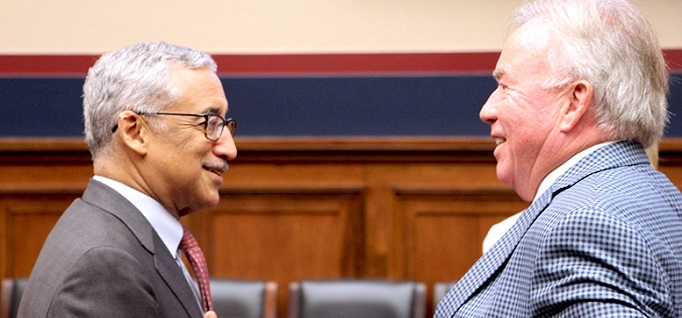Pivoting to adults for workforce needs
By Matthew Dembicki
June 5, 2019
Virginia’s community colleges work to better serve adults, help fill high-demand jobs.
In Virginia, community college leaders are, in part, following population trends to help determine where to focus when it comes to workforce development and other services.
With an impending decline of traditional college-age students and an increase of state residents ages 25 to 44, Virginia’s community colleges are developing programs to better serve older adults, especially those in rural areas. Ignoring this population — especially as employers are desperate for skilled workers — would be negligent, said Glenn DuBois, chancellor of the Virginia Community College System.
DuBois spoke in May on a panel before the House Higher Education and Workforce Investment Subcommittee, which held a hearing to examine how community colleges, historically black colleges and universities and minority-serving institutions serve their communities and provide economic mobility for their students.
To help connect available jobs with older adults — knowing they typically juggle family life and other responsibilities and often live paycheck to paycheck — the community college system developed an affordable, short-term training program called FastForward. In nearly three years, Virginia community colleges have awarded more than 13,300 high-demand credentials through the program, DuBois said.
“Twelfth grade is no longer the finish line, my friends, to have a shot at the middle-class lifestyle,” he said. “But you don’t need a bachelor’s degree, either.”
The results of FastForward so far are promising. The pay-for-performance program has completion and job placement rates that exceed 90 percent, DuBois said. Completers also see a 20 percent to 50 percent increase in their take-home pay. That’s significant since 20 percent of FastForward participants were on public assistance in the three years prior to joining the program — “and now they’re not,” he said.
Pell would be a plus
The most expensive FastForward programs cost students $1,500 out of pocket, DuBois said. That’s still a stretch for many families. Forty percent of Virginia households are one emergency away from being in financial stress, he said.
That’s where federal aid, such as Pell grants, can help, he said. Allowing Pell grants to help students take short-term, non-credit training programs “would be transformative,” he added.
Several committee members indicated that the idea has gained traction in Congress, but they question how to ensure the quality of such programs. DuBois said it would require a strong accountability system that includes program completion data and income gains for program graduates, much like what’s done with FastForward.
Help with other challenges
Committee members and witnesses at the hearing also discussed the various challenges that a growing number of college students are facing, especially food insecurity and homelessness. In Virginia, each one of the 23 community colleges has a food pantry, but that’s not enough, DuBois said.
“We can’t food-pantry our way out of this,” he said, noting that the solution requires, in part, helping students connect with resources such as public assistance. He added that community college students, who are often the first in their families to attend college, also face other challenges, which more colleges are trying to address through orientation and student services.
“Whatever extra dollar that we have we want to invest it in student services,” DuBois said, explaining that community college students need coaching from day one, guidance, social workers and more. “They need people who understand where the resources are in the community and put those students in touch with those resources.”
Other topics discussed at the hearing included transferring from a community college to a four-year school as a way to reduce college costs and reorganizing developmental education to include co-requisite requirements and contextualized learning.
This article originally appeared in CC Daily.



